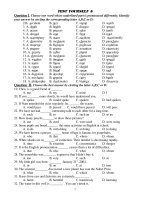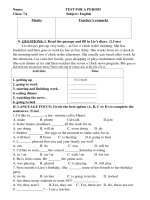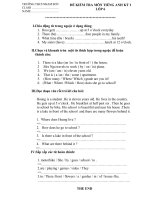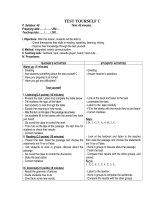TEST YOURSELF A pps
Bạn đang xem bản rút gọn của tài liệu. Xem và tải ngay bản đầy đủ của tài liệu tại đây (21.17 KB, 3 trang )
TEST YOURSELF A
I. Choose the word whose underlined part is pronounced differently from the others.
1. A. brings B. leaves C. coughs D. days
2. A. goes B. shoes C. knows D. uses
3. A. tastes B. washes C. buses D. arranges
4. A. derived B. cleaned C. cancelled D. guessed
5. A. promoted B. added C. pressed D. founded
II. Choose the word whose main stress is placed differently from the others.
1. A. social B. conduct C. survey D. value
2. A. marvelous B. attention C. consider D. excited
3. A. verbal B. whistle C. precede D. marriage
4. A. attract B. decide C. reject D. beauty
5. A. solution B. suitable C. confidence D. family
III. Vocabulary and structure
1. Don’t worry. I’ll you a hand with the washing up.
A. borrow B. give C. return D. take
2. Birds make nests in trees _________ they can hide their young in the leaves and branches.
A. which B. where C. that D. in where
3. Why don’t you make it bigger and more colourful in order to people/s attention.
A. keep B. hold C. attract D. raise
4. It is almost _____________ for young people leaving school today to get a job.
A. possible B. impossible C. possibly D. impossibly
5. She this cool pair of blue sunglasses.
A. is just buying B. has just bought C. had just bought D. is just going to buy.
6. Then, he something that his boss sometime before.
A. remembered/had said B. had remembered/said
C. remembered/ was saying D. was remembering / said
7. They explained that they a slight technical problem.
A. would have B. were having C. are having D. have had
8. He that she had been chosen to play in the national team.
A. said her B. told C. talked to her D. told her
9. They wanted to know in the area .
A. how long would you stay B. if you would stay how long
C. how long you would stay D. how long will you stay
10. She asked me you work on the project.
A. if you had finished B. whether you finished C. you had finished D. if you have
finished
11. It’s not easy to change people’s toward a certain problem.
A. attitude B. idea C. opinion D. thinking
12. We have decided to interview only ten _________________ for the job.
A. appliances B. applicants C. applicable D. applications
13. The government encourages all of the students in all parts of the country _______ the
compulsory education.
A. to finish B. finish C. finishing D. finished
14. Non – verbal such as waving, nodding or shaking of the head also have cultural
meanings.
A. signs B. signals C. hints D. marks
15. You should ask him about your choice because he often made the right _______.
A. decides B. decision C. decisive D. deciding
16. If I ____________ it was a formal party, I _______________ jeans and a jumper.
A. knew – wouldn’t have worn C. had known – wouldn’t wear
B. knew – wouldn’t wear D. had known – wouldn’t have worn
IV. Choose the word/phrase that would not be appreciate.
1. He asked if I can make an appointment.
A B C D
2. It’s the first time I saw this film
A B C D
3. Mike told that he was leaving the next day, not then.
A B C D
4. They asked us to not talk about the matter any more.
A B C D
5. She said she works eight hours a day except Sunday.
A B C D
V. Reading comprehension:
CONVERSATIONAL TURNS
Probably the most (1)……… recognized conversational convention is that people take
(2) speaking. But how do they know when it is their turn? Some (3.) must
be present, otherwise conversation would be continual breaking down into a disorganized
jumble of interruption and simultaneous talk.
Turn – taking cues are usually quite subtle. People do not simply (4) talking when
they are ready to yield the floor. They usually signal in advance that they are about to
conclude .The clues may be semantic (“ so anyway, “ or “ Last but not least, ”); but more
commonly the speech itself can be modified to show that a turn is about to (5)……… –
typically, by lowering its pitch, loudness, or speed.
Body movements and patterns of eye (6) are especially important. While speaking
,we look at away from our listener in about equal (7) ; but as we approach the end of a
turn, we look at the listener more steadily.
Listeners are not passive in all of this. Here too there are several ways of (8)……… that
someone wants to speak next. One way is though an observable increase in body tension – by
learning forward or producing an audible intake of breath. A less subtle approach is simply to
(9)………… - a strategy that may be tolerated , if the purpose is to (10) what the
speaker is saying , but that more usually leads to social disapproval.
1. A. widely B. completely C. easily D. largely
2. A. sides B. care C. interest D. turns
3. A. regulation B. rules C. norms D. laws
4. A. stop B. end C. start D. give up
5. A. end B. stop C. complete D. final
6. A. movement B. contact C. look D. appearance
7. A. parts B. shares C. turns D. proportion
8. A. signing B. signaling C. hinting D. saying
9. A. break B. cut C. interrupt D. interfere
10. A. clear B. paraphrase C. repeat D. clarify
VI. Structures:
1. He didn’t have to retake the exam although he got bad results.
A. Because he got results, he didn’t have to retake the exam.
B. In spite of the bad results of his, he didn’t have to retake the exam.
C. Despite his bad results, he didn’t have to retake the exam.
D. Because of results, he didn’t have to retake the exam.
2.“I have found a new flat, “ said Ann.
A. Ann said that she has found a new flat. B. Ann told that she had found a new flat.
C. Ann said me that she had found a new flat D. Ann said to me that she had found a
new flat.
3. I have never played golf before.
A. This is the first time I have ever played golf. B.I used to play golf but I gave it up
already
C. It’s the last time I played golf. D. It is the first time I had played golf .
4. “ What made you change your mind ? “ John asked.
A. John asked me what made me change my mind.
B. John wanted to know what had changed his mind.
C. John asked me what had made me change my mind.
D. John said to me what had changed his mind.
5. You drink too much coffee, that's why you can't sleep.
A. If you drank less coffee, you would be able to sleep. B. You drink much coffee and you
can sleep.
C. You would sleep well if you didn't drink any coffee. D. You can sleep better without
coffee.









